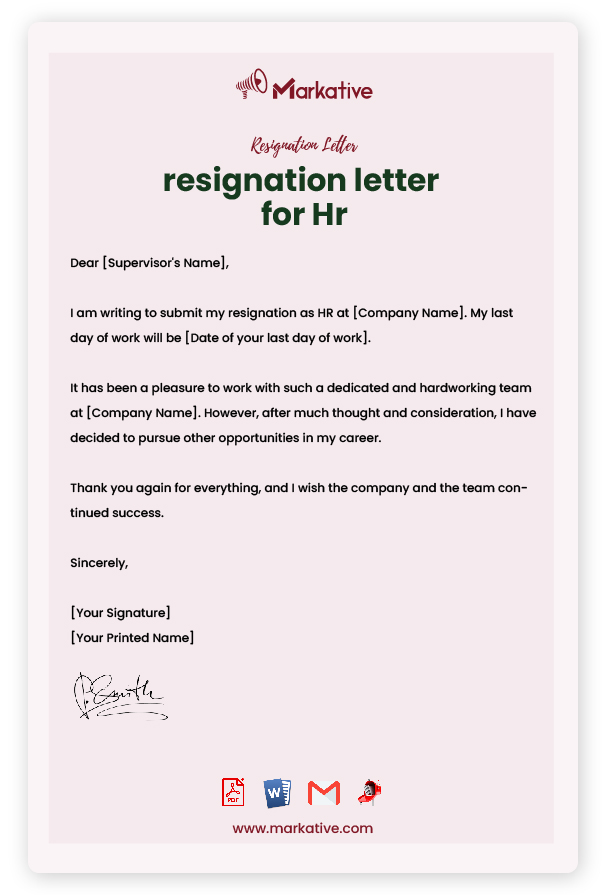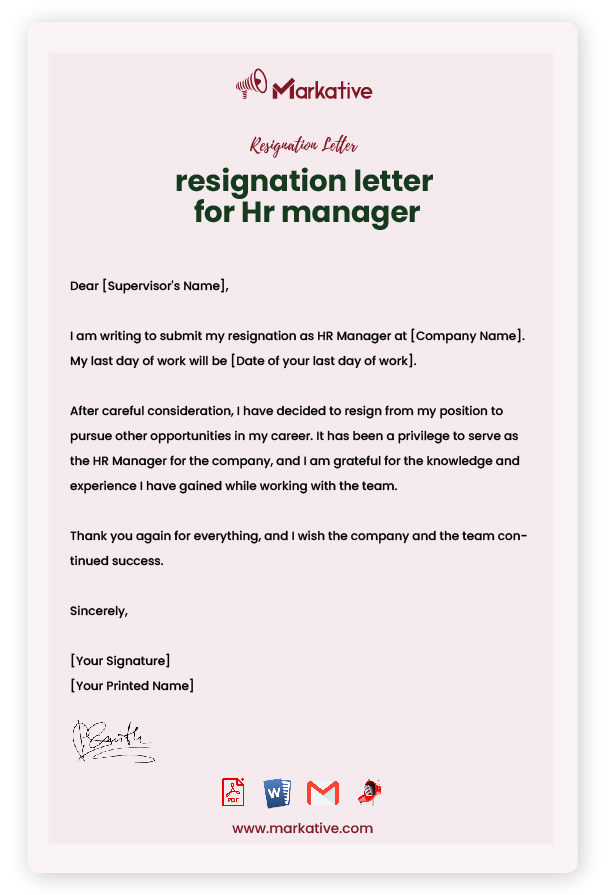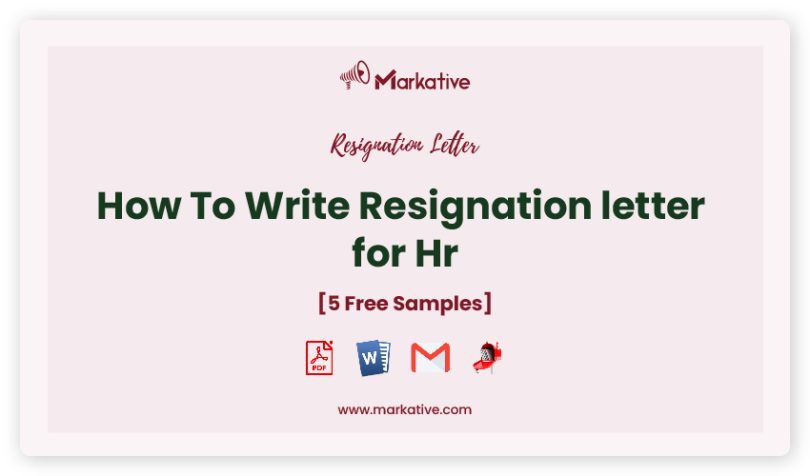Resignation is an inevitable part of any organization’s lifecycle. Employees leave their jobs for various reasons, and it’s important that they communicate their decision formally through a Resignation Letter for HR. A resignation letter is a formal document that informs an employer of an employee’s intention to leave the job. It is an essential document that not only serves as a record of an employee’s departure but also affects their professional reputation.
Writing a good resignation letter is crucial as it creates a lasting impression on the employer and colleagues. A well-written resignation letter can help an employee leave on good terms, maintain their professional relationships, and even open up opportunities for the future. On the other hand, a poorly written resignation letter can damage an employee’s reputation, burn bridges, and make it difficult for them to secure future employment.
In this article, we will delve deeper into the importance of a resignation letter for HR, highlighting the significance of a well-written resignation letter, and providing practical tips for writing one. Whether you are leaving your job due to better opportunities, career growth, or personal reasons, this article will help you write a resignation letter that creates a positive impact and leaves a lasting impression on your employer and colleagues.
How To Write Appealing Resignation Letter for HR?
Writing a resignation letter can be a challenging task, especially when you want to maintain a positive relationship with your employer. In this guide, I will provide you with five steps to help you write an appealing resignation letter for HR, along with some examples to give you inspiration.
5 Steps on How To Write Appealing Resignation Letter for HR With Examples:
Step 1: Start with a formal greeting – Address your letter to your HR manager and use a formal greeting such as “Dear [Manager’s Name],”
Step 2: State your intention to resign – Be clear and concise about your decision to resign from your position.
Step 3: Express gratitude – Show appreciation for the opportunities and experiences you gained while working at the company.
Step 4: Offer assistance – If possible, offer to assist in the transition process by training your replacement or completing any outstanding projects.
Step 5: End on a positive note – End the letter with a positive statement, expressing your well wishes for the company and your colleagues.
Example:
Dear [Manager's Name], Please accept this letter as formal notice of my resignation from my position as [Your Position]. I want to thank you for the opportunities and experiences I gained while working at [Company Name], and for the support you provided during my time here. I am committed to making the transition process as smooth as possible and am available to assist in training my replacement or completing any outstanding projects. I wish the company and my colleagues all the best in the future.
Conclusion: Writing a resignation letter may seem daunting, but by following these five steps and using the examples provided, you can write an appealing resignation letter for HR that maintains a positive relationship with your employer. Remember to be professional, courteous, and appreciative, as it will reflect well on you in the future.

Resignation Letter for HR with Notice Period
[Your Name] [Your Address] [City, State ZIP Code] [Your Email Address] [Date] [Recipient Name] [Recipient Position] [Company Name] [Address] [City, State ZIP Code] Dear [Recipient Name], I am writing this letter to inform you that I have decided to resign from my position as [Your Position] at [Company Name]. After careful consideration, I have decided that it is time for me to move on and explore new opportunities. As per the terms of my employment contract, I am providing [Notice Period] weeks/months notice, with my last day of work being [Last Day of Work]. During this notice period, I will ensure that all my work is completed and that I will assist in transitioning my responsibilities to my successor. I would like to take this opportunity to express my gratitude for the support, guidance, and opportunities provided to me during my tenure at [Company Name]. I am grateful for the experiences and knowledge gained, which will undoubtedly serve me well in my future endeavors. Please let me know if there is anything I can do to assist in the smooth transition of my departure. I will do everything possible to ensure a seamless handover of my responsibilities to my successor. Thank you for the wonderful experience and opportunities you have provided me. I will always cherish my time at [Company Name]. Sincerely, [Your Name]
Resignation Letter for HR without Notice Period
Dear [Manager's Name], I am writing to inform you that I have decided to resign from my position as [Position Title] in the Human Resources department, effective immediately. I understand that this decision comes without providing the required notice period, but due to unforeseen circumstances, I must make this decision to prioritize personal reasons. I apologize for any inconvenience that this may cause to the company and the team, and I will ensure a smooth handover of my responsibilities and duties to my colleagues. I have thoroughly enjoyed my time working with the HR team and contributing to the growth of the company. Thank you for the opportunities and experiences that I have gained during my tenure here. Please let me know if there is anything further that I can do to assist with the transition process. Sincerely, [Your Name]
For More: How To Write Letter to HR Manager for Complaint [5 Free Samples]
Resignation Letter for HR with Reason
[Your Name] [Your Address] [City, State ZIP Code] [Your Email] [Date] [Recipient Name] [Recipient Title] [Company Name] [Address] [City, State ZIP Code] Dear [Recipient Name], I am writing to inform you that I am resigning from my position as [Your Job Title] at [Company Name], effective [Resignation Date]. Please accept this letter as my formal resignation. The reason for my resignation is [Reason for Resignation]. While I have enjoyed working with the company and have learned a great deal during my time here, I have decided to pursue other career opportunities that better align with my personal and professional goals. I want to express my gratitude to you and the entire human resources team for the support and guidance provided to me during my tenure at [Company Name]. I am proud to have been a part of such a talented and dedicated team. In the coming weeks, I will do everything possible to ensure a smooth and seamless transition. Please let me know if there is anything I can do to assist during this time. Thank you for the opportunities you have given me during my time here, and I wish you and the company all the best in the future. Sincerely, [Your Name]
Resignation Letter for HR without Reason
Dear [Manager's Name], I am writing to inform you that I have decided to resign from my position as an HR [position title] effective [date of resignation]. While I understand that this may come as a surprise, I have made this decision after careful consideration and reflection. I want to express my gratitude for the opportunities and experiences that I have gained during my time here at [company name]. I have learned so much, and I am grateful for the support and guidance that I have received from my colleagues and managers. Although I am not able to provide a specific reason for my departure, please know that my decision is based on personal factors and circumstances that I feel are best for me at this time. I will do everything possible to ensure a smooth transition during my remaining time here. I am willing to assist with the transfer of my duties and responsibilities, as well as any other tasks that may be needed to ensure a seamless handover. Thank you again for the opportunity to work with such a great team. I wish you and the company all the best for the future. Sincerely, [Your Name]
Urgent Resignation Letter for HR Sample
[Your Name] [Your Address] [City, State ZIP Code] [Date] [Employer's Name] [Employer's Address] [City, State ZIP Code] Dear [Employer’s Name], I am writing to inform you that I am resigning from my position as [Your Position] at [Company Name], effective immediately. This decision has not been an easy one, but I feel it is the best course of action for me at this time. I would like to express my appreciation for the opportunities I have had while working with the company. I have gained valuable experience and knowledge during my time here and have had the privilege of working with many talented and dedicated individuals. I understand that my departure may cause some inconvenience to the company, and I apologize for any inconvenience caused. I will do my best to ensure a smooth transition of my responsibilities to my successor. Please let me know if there is anything else I can do to assist with this transition. Thank you for your understanding and support. Sincerely, [Your Name]
How Much Notice Should You Give for a Resignation Letter for HR?
According to the Bureau of Labor Statistics, the number of people resigning from their jobs has been steadily increasing over the past few years. In 2020, the resignation rate reached an all-time high of 2.7% per month. This trend is expected to continue as more people prioritize flexibility, work-life balance, and career growth.
In terms of how much notice an employee should give when submitting a resignation letter, there are no hard and fast rules. However, it is generally considered professional to provide at least two weeks’ notice. This gives the employer enough time to make arrangements for a replacement, transition the departing employee’s responsibilities, and conduct an exit interview. However, in certain industries or job roles where the employee’s departure could have a significant impact on operations, it may be appropriate to provide more notice. Ultimately, the amount of notice given should be discussed and agreed upon between the employee and their supervisor or HR representative.

Is it Ok To Email a Resignation Letter for HR?
It is generally acceptable to email a resignation letter to HR, especially if you work remotely or are unable to deliver it in person. However, it is always a good idea to check with your company’s policies and procedures first, to ensure that emailing your resignation letter is an acceptable form of communication. Additionally, it’s important to make sure that your resignation letter is clear, concise, and professional in tone, regardless of how it is delivered. For example:
Dear [HR Representative], I am writing to inform you that I have decided to resign from my position as [Job Title] at [Company Name], effective [Date of Resignation]. I have greatly appreciated the opportunities and experiences that I have had while working here, and I will do everything I can to ensure a smooth transition during my remaining time. Please let me know if there is any additional information that I can provide or any tasks that I can complete to assist in the transition process. Thank you for your understanding. Sincerely, [Your Name]
Common Mistakes When Writing a Resignation Letter for HR?
- Not being clear about the reason for resigning: It’s important to clearly state why you’re resigning in your letter. This will help HR to understand your situation and may provide them with the opportunity to address any issues you’ve encountered. Being vague or unclear can create confusion and may lead to further misunderstandings.
- Being too emotional: While it’s understandable that resigning from a job can be an emotional experience, it’s important to keep your resignation letter professional and objective. Avoid using emotional language, making accusations or expressing anger, as this could damage your professional reputation and future job prospects.
- Failing to provide adequate notice: In most cases, you’ll be required to provide a certain amount of notice before leaving your job. Make sure you check your employment contract or company policy to determine what this notice period is. Failing to provide adequate notice could impact your ability to receive a reference from your employer in the future, as well as your final pay and any entitlements such as unused leave.
For More: How To Write a Resignation Letter for Board of Directors [5 Free Samples]
Conclusion:
Writing a resignation letter can be a daunting task, but it is an important part of leaving a job on good terms. When drafting your letter, be sure to include a clear statement of your intention to resign, your last day of work, and a brief explanation of your reason for leaving. It is also important to avoid common mistakes, such as being overly negative or critical, and to proofread your letter carefully before sending it.
When it comes to sending your resignation letter, you should typically provide at least two weeks’ notice to your employer and send your letter to your immediate supervisor and to HR. This ensures that your resignation is properly documented and that your employer has time to make arrangements for your departure.
To help you get started, we have included several free and ready-to-use resignation letter templates that you can customize to fit your specific situation. Whether you are leaving a job for personal reasons, starting a new job, or retiring, these templates can help ensure that your resignation letter is professional, respectful, and well-written. By following these tips and using these templates, you can make the process of resigning from your job as smooth and stress-free as possible.







